One of the reasons why we game is because we want an experience that lasts. A perfect moment of victory or seeing a hero’s journey play out to the end; it’s why the idea of winning an 100-person battle royale is so appealing, and it’s also why games with dramatic storylines can stick with us for years after we beat them. Another reason we play is because we want to share great experiences with others. It’s why small co-operative video games like Peak and Headliners are seeing such an influx of players. It’s why actual plays of ttrpgs are gaining so much traction that Dimension 20 was able to sell out Madison Square Garden this year.
People want to gather and talk and be excited about the things they experience. They also want to watch moments unfold where they know their choices helped cause in an environment dedicated to experimentation and fun, something that feels personal. This is one of the core tensions I feel game design tries to balance and solve throughout all of its mediums, from digital to pen-and-paper. However, each of these approaches has its own upsides and downsides.
A tabletop game of Dungeons and Dragons can be incredibly memorable, but as you add more players, it becomes more unwieldy… not to mention scheduling repeated sessions to complete a campaign. A wargame such as Warhammer can be an amazing immersive experience, but individual games are usually one on one, and collection can be expensive. Meanwhile, online games like Halo or WoW are wonderful because of how accessible they are, but are stymied by issues with balance and anonymous trolls hijacking games away from their original vision. Handcrafted story-intensive video games like Baldur’s Gate or Subnautica are fantastic, but are limited as something you experience solo, then speak about with others later.
This is where megagames come in. Megagames are a rare, wonderful style of game that have given me an experience unlike any of the others I’ve listed above. Where else can I become embroiled re-enact the American Revolution in just six hours? How else can I feel like I’m truly a part of a group of ship captains looking for traitors as we flee for our lives through space? How else can I have this much fun with 50 other people in the same room, all sharing the same experience and creating the same cohesive story as me?
PAX Unplugged is around the corner, and one of the many things they offer is a chance to play in a megagame. Let me try to sell you on signing up for one.
What Is A Megagame, And Who Are They For?
I’ve been fortunate enough to be a part of two different events. They both took place at PAX Unplugged, albeit years apart, each with very different themes, which I hope puts me in a good position to talk about Megagames as a concept as a player, and try and help people decide if they are worth signing up for.
First however, we have to define what a megagame actually is. They really are their own category, but if I had to boil it down, Megagames are a strange hybrid of tabletop rpg and board game, with a splash of LARP immersion. It’s a pressure cooker that tries to pack as much content into one room as possible, as well as packing as many people as it can into that shared experience at the same time. In the megagames I’ve read about or experienced personally, game size is typically between 40-60 players, but you can have some smaller and some larger.
To help summarize, I’m just going to quote directly from the Philadelphia Megagames page here.

Megagames are a hybrid of classic board gaming, tabletop roleplaying, and then a splash of LARP flair thrown in at times as well. The main point that makes it stand out though is the ‘mega’ aspect: games usually take place in one long extended session, with a bunch of people. While I’ve seen longer or shorter games, the average is 6-8 hours long, usually making sure there’s a break for lunch or dinner. Again, while size varies, the ‘standard’ megagame has anywhere between 40-60 people playing in it, and 4-6 people running it. Finally, the last thing that makes a game ‘mega’ is the scope of story; instead of playing as a plucky individual adventurer or hero, you are often playing as the head of a governmental agency, the captain of a ship, a head scientist on a space station, and so on. You are trying to save your country, your ship, even your entire civilization.
If you’ve heard of megagames before, you’ve probably been referred to this charming video when Shut Up And Sit Down played their first megagame, Watch The Skies. To be fair, it's a great example. The premise of Watch The Skies, essentially the classic megagame by this point, is that aliens have landed on earth, and most players are broken up into teams by various counties. You are trying to stop the aliens or at least figure out what is going on, but not all players are working toward the same goals. They play as the leaders of Japan, but quickly find themselves at odds with other nations who are trying to deploy their own spies, get a technological advantage in science… maybe even defecting to work with the aliens?
On a mechanical level, Megagames are usually broken down into turns. Players are grouped up into smaller squads, and each squad has its own set of specialist roles. Typically, players will have a certain amount of time each turn to work together at their own table, and then each role will spend some time each turn broken off into smaller subgames that influence the rest of the game state. In Watch The Skies for example, the Prime Minister/Presidents of the world have to keep up public relations and negotiate with other nations, secretaries of defense run over to a Risk style board and assign military and spy assets, and scientists attempt to collect research tokens to upgrade defense, improve the lives of their citizens, and so on.
On paper, this sounds like a recipe for disaster. It’s a massive time investment that requires immense coordination, and players can act in entirely spontaneous ways to throw off the plans of everyone else involved. There are so many places where it sounds like the game can just go wrong, getting snarled up in rules questions and lengthy explanations that make everything drag on.
Yet, it’s that bold idea that makes the megagame sound so compelling. Many other gaming experiences give you get the ability to play out a set story or write your own with some close friends, but a megagame is this grand experiment where you get dozens of people all trying to shape a crisis in their own way, making it mutate and evolve so rapidly that it always feels fresh and new and exciting and fun. Every moment can feel tense because you both feel so helpless as part of a bigger machine and as if you have all the power to change the course of the game entirely. Sure, the two events I was involved in were five hours long, but I promise you, that time speeds by as you find yourself falling into the unfolding story.
If there’s one lesson to be learned from this article, it’s this: the more you invest and commit to the bit, the more fun you are going to have. Megagames are awesome if you find one that fits a theme you enjoy, and the more energy you bring to the event, the better. This is a huge article, so please feel free to skip to the end or stop here, but these next sections catalog my experience playing two very different megagames that I hope will be helpful to those who read it.
First Experience: The World Turned Upside Down (2017)

2017 was the first ever PAX Unplugged, and my first ever megagame. It was my first ever board game convention too, so I was there to try and experience things I wouldn’t be able to elsewhere. My friends Antonella and Joy had seen it on the schedule the day before while we sat down for dinner, and suggested we sign up. When else after all could we try to be part of the American Revolution?
The World Turned Upside Down is a megagame that re-enacts those years of America attempting to gain independence. Nella and I had lots of fond memories talking and passing notes in high school history classes, and it was right up her alley. It was being put on by a company called Ironmark Games, and reservations were first-come, first-serve. Nella got our group on the wait list that morning, and Friday Night at about 6pm, through sheer luck we were called in to play after paying our registration fee of (I believe) about $30-40 dollars each.
In a matter of moments, we were ushered into a large conference room with a massive map of the 13 colonies and sat down at the nearest table that represented our assigned colony. Again, through complete chance… we ended up being Virginia. Antonella practically shouted when she realized she could be George Washington, claiming it. Her one-day wife, Joy, joined her in the role of going to congress as Thomas Jefferson while my friends Christina and Geoff chose to be our war generals. This left me as Spymaster Lane. I wasn’t sure how I felt about not getting to play with the massive risk board, but I quickly fell in love with my role.
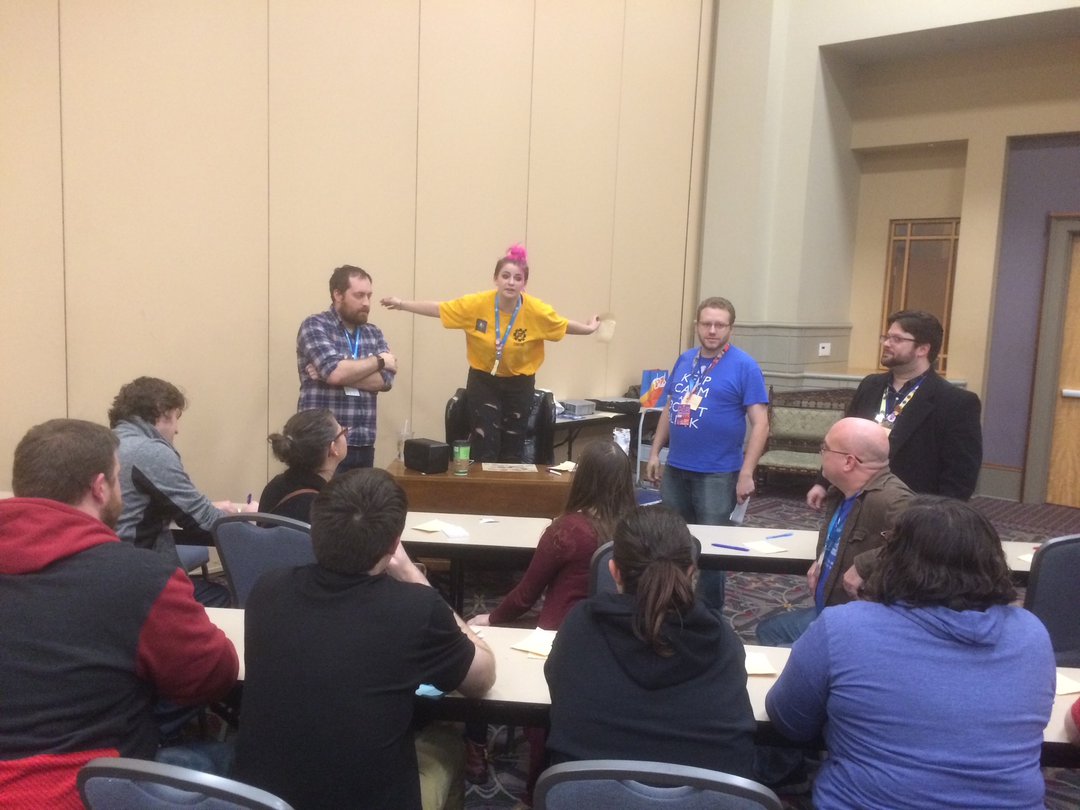
Antonella, Joy, and other colony representatives ready to pass laws. I was told the desk they had was actually an extra replica of the ones from Independence Hall just a few blocks away, which was a great touch. Side note: because the mega games this year had sign up only during the convention itself, there wasn’t any real dress up or cosplay, with the exception of a hat or two the developers handed out. Dressing for your part isn’t a requirement for megagames, although some people find it fun to do so to add a level of immersion.
Each turn was going to be roughly 30-45 minutes, and represented a full year. You had 15-20 minutes at your table with your own colony to plan out what you wanted to do, and the rest of the time was spent at your individual minigame. Nella and Joy went to congress, and their role was to get colonies all on the same page, enact laws for all colonies, and coordinate with other congress players. Geoff and Christina got to go to the huge risk board and shout orders of where troops should go, where they should defend, and roll the dice to see how many lived or died… all while other generals frantically did the same, trying to coordinate or shore up their individual defenses.
My minigame felt a little more abstract. The 13 spymasters of the colonies went up against the 13 spymasters of the British (also played by convention goers!) in a strange card bluffing game where you bet which card would be higher, getting the other spymaster’s card if you were correct. You could use information from previous flipped cards to hedge your own bet, and winning meant earning resources for your colony; besides taxes, the Spymasters were essentially in a cold war to help fuel the economies of the rebels.
Speaking of, an interesting twist was that the game started before 1776. We weren’t in open revolt yet, but the Boston Massacre had happened, and each colony had to decide whether to initiate the revolution immediately or attempt to make peace with Britain, even as they raised taxes on our limited funds.
One of my favorite parts of this Megagame was the limits on communication. This WAS the 1770s after all, so while you sat at your colony table, you could not get up and talk to other colonies. Some smaller delegations such as the Carolinas got to sit together, but you didn’t get to just walk around however you saw fit. Instead, you got scraps of paper, wrote down hasty notes, and put up a hand, shouting “RUNNER!”. The Ironmark Games staff and volunteers would rush over, you would explain ‘please deliver this note to Rhode Island’, or sometimes ‘please send this to the Spymaster of New Jersey, his eyes only’, and then pray you would get a response in time to be useful.
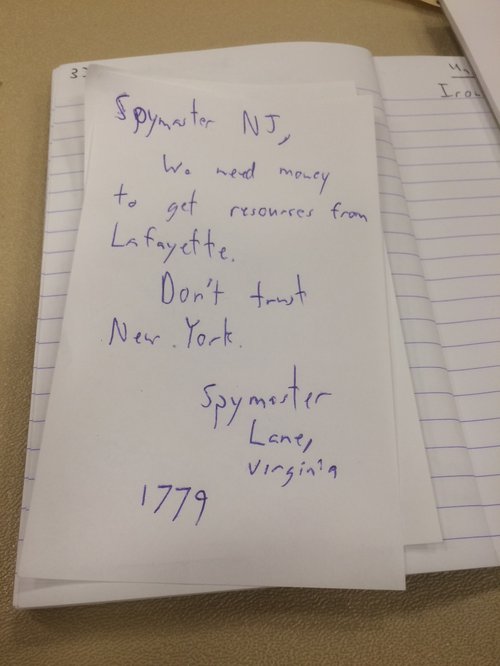
In my opinion, this limitation made the game feel magical. The world felt bigger and more unknowable, with each player suddenly so much more valuable because each player only had a piece of the puzzle. Generals would come back from the war table and share troop movements, but also lean in and explain how they had a hurried conversation with Pennsylvania generals how their delegation wasn’t going to send troops to the besieged Carolinas. This would then prompt our George Washington to demand more information and prepare writing a speech about how we have to unify against Britain in congress, and I was tasked to get more details. At the end of the next turn, I would come back from the Spymaster minigame with some money, sure, but more importantly, a small conspiracy of spymasters including New Jersey, Rhode Island, and Maryland had started to make it our job to push our congressfolk towards open and active rebellion, sharing what information we had collected so we could figure out which colonies might still stand with the British.
Again, it’s been years since this game, but here’s a rough timeline of what happened from my perspective:
- At game start, all congress representatives agreed to ‘hesitate’ on outright war with Britain. In Virginia, we had decided we wanted to rebel (of course), and started working on trying to get other colonies to start arming themselves and allying just up to the point of direct revolt.
- The British landed a bunch of troops in the Carolinas. You know, to ‘keep the peace’. There was still that small contingent in Boston, and it was sneakily growing bigger as tensions flared. These groups were already ready to rebel and were in skirmishes, with our generals and others not wanting to interfere and cause war early… while promising quietly we were ready to send in soon.
- The British did something sneaky, offering up tax breaks and promises of neutrality to certain colonies. Namely, Georgia, New York, and Pennsylvania. They were trying to make sure their southern forces weren’t fighting on two fronts, and they wanted to isolate the more aggressive colonies like Massachusetts and us in Virginia… Nella’s fiery speeches made it clear we weren’t going to stay neutral forever.
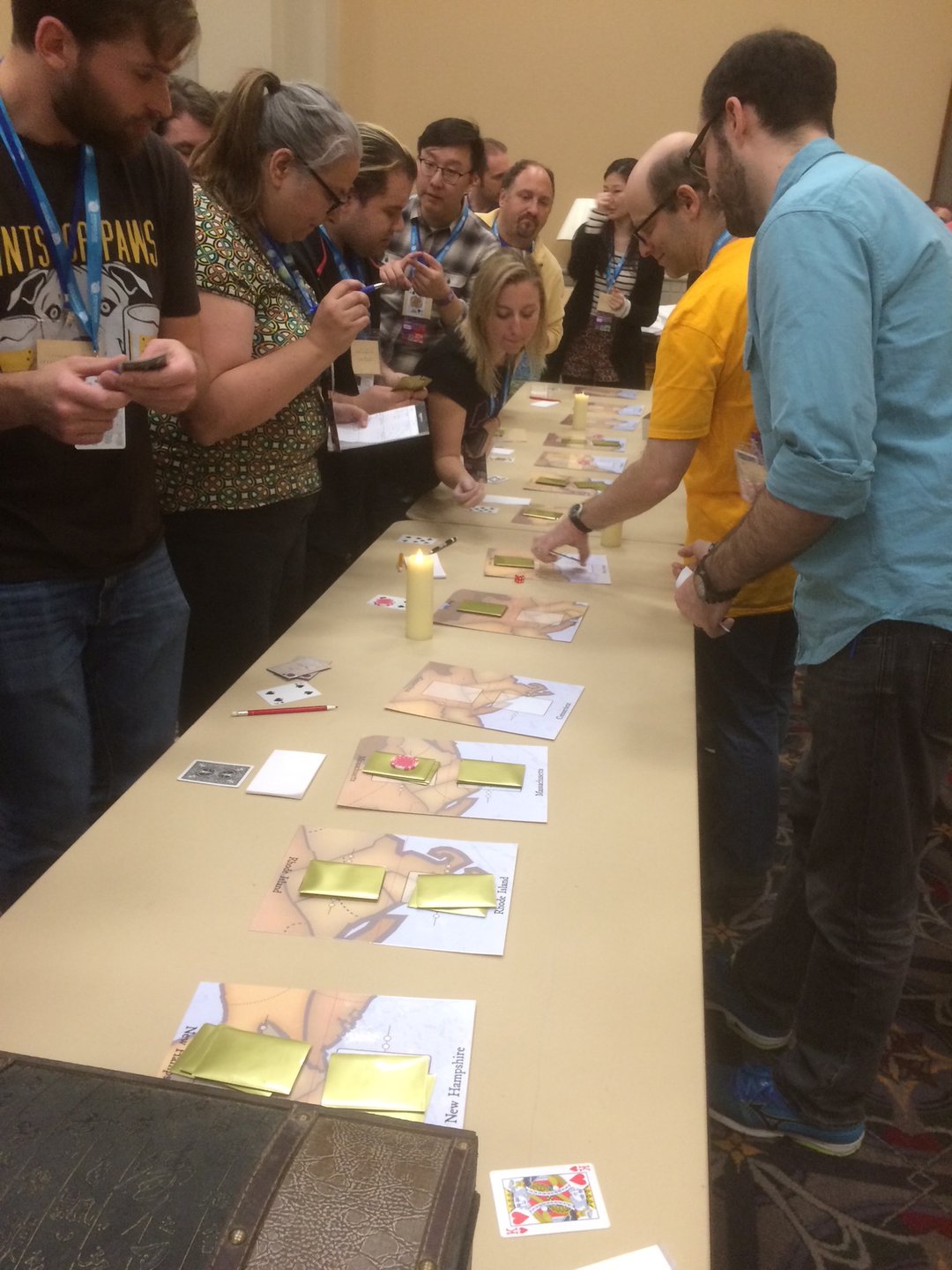
- Working with who was quickly becoming my best friend, the Spymaster of New Jersey, we found a way to sweep an insane amount of money during the spy games by stacking the bluffs, enough so the game designers had to change the rules between turns. Knowing that the south is getting crushed by the British and that the central northern colonies haven’t yet joined the fight, I take the winnings meant for Virginia's defenses, press them into New Jersey’s hands and say “get this to Pennsylvania. Tell them George Washington sends their regards”.
- My team was equal parts horrified and delighted by my actions, since I barely brought back any money but hopefully won allies. Nella and Joy became note writing machines, including little heart emojis and flirts in their back-and-forth missives with several colony leaders in process as the stress and caffeine got to us. Were got some promises of support and thank yous for the funding. Nella as Washington declared revolution in congress officially, and (I am 90% sure) all colonies officially revolted at that moment. The cold war was over. Geoff and Christina push our troops south into the Carolinas, holding the line with some lucky dice rolls even as the war almost makes it to our border.
- In the middle of all of this, perhaps because all players live in the future and know how America won the war, Congress had started a funding project to get Lafayette and the French to send troops, which all came to a head as open revolution was declared. Based on my notes, we were balancing saving up money, our defenses, and deciding who to trust.
- Things turned quickly now. The northern British invasion was crushed as New York and Pennsylvania rolled out all their reserves, pushing the redcoats back into Canada. We sent out note after note of thanks, out of relief and also to keep allies close. Hercules Mulligan sent a note with an eggplant emoji to George Washington. Antonella has cherished this note ever since.
- By this point, it looked like we could win… and then Lafayette landed in the Carolinas. The sea of red dice breaks apart, slowly turning blue. At around 11pm, the British declare defeat, and announce that they will let the Americans rule themselves.
The end was slightly anticlimactic, but the gamble the British played to divide us up nearly worked. Bless some of the spymasters, we exchanged so many high fives and even hugs at the end of the game because without our little cadre working to unify, there was a good chance a divided set of colonies wouldn’t have been able to survive. Those opening turns of learning the game, getting our bearings, and also realizing how thick the fog of war was absolutely immersed us in the world.
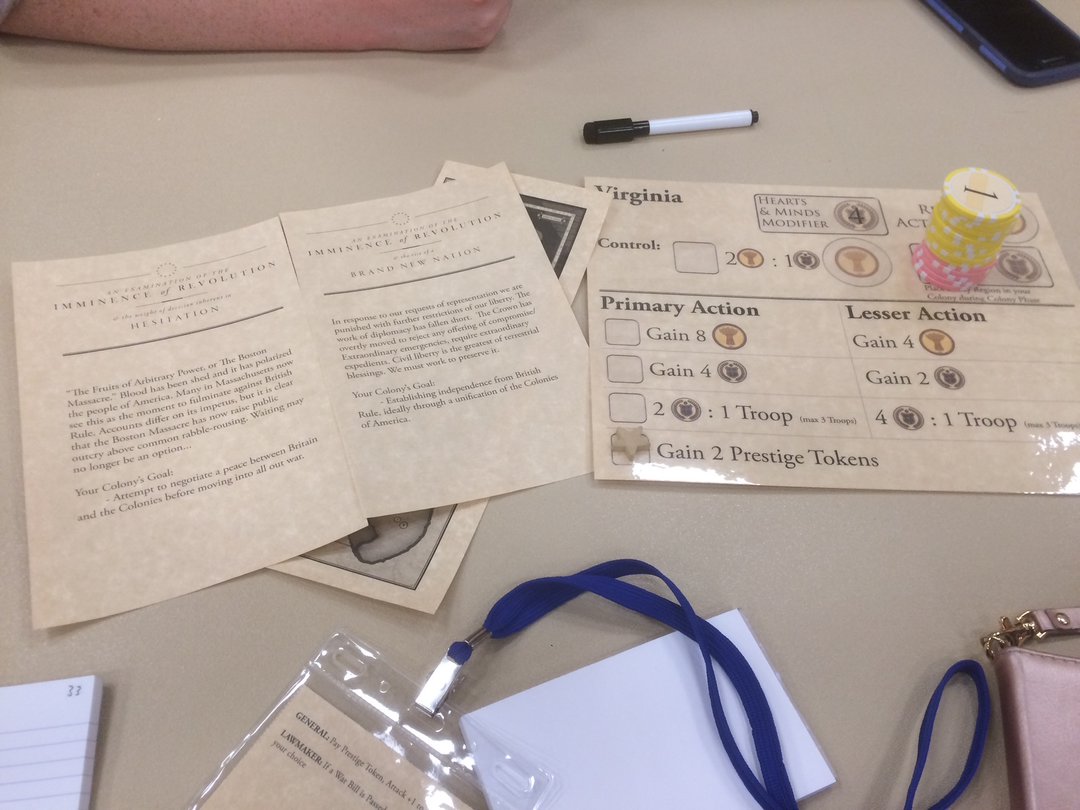
This is what we started the game with - a choice about rebelling immediately, and some hand outs to keep track of our funds and supplies. Over 5-6 hours, the whole world felt alive thanks to the actions of other players and the organizers.
We had started roughly at 6pm, really kicking off after learning our roles and the rules, and had wrapped right before 11 at night. I can safely say it was probably the fastest five hours of my life. Every moment felt like I had something to do, or like I wanted to talk to someone, writing notes and desperately waiting for information to be run over to me. If I did get a break, I was genuinely thankful, just staring in astonishment with my fellow Virginians as we all couldn’t get over the experience we were all having together and apart at the same time.
Genuinely, one of the best gaming experiences of my life.
Second Experience: Den of Wolves (2024)
For the sake of brevity and bluntness, I’m going to preface this section by saying I enjoyed this one less than The World Turned Upside Down. I am also going to give this megagame experience a glowing review, because I saw a ton of other people who played in this game having the time of their lives. When I did exit interviews, I got a half dozen people running up to me excitedly raving about their experience, the reactions very much like my own from years before! With that in mind, think of much of this section being a 'cautionary tale' rather than cynical criticism. If the theme of this game is up your alley, you should definitely give it a shot.
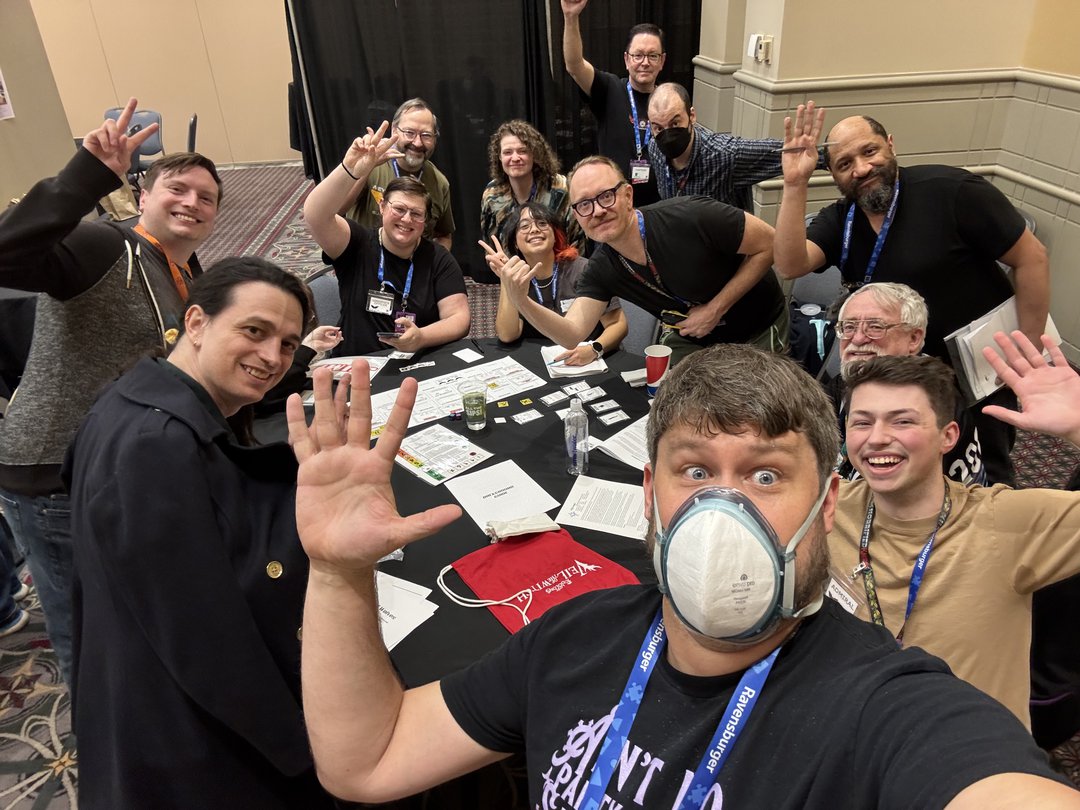
A selfie I took near the end of the game, while the ship captains were trapped together during a ship raid on the fleet. Fun fact: two of the three hidden traitors were in this picture! Jerks.
Den of Wolves is a sci-fi themed megagame that stands as a great contrast to the last game I had played in. While I have never watched Battlestar Galactica (I know, I’m an awful nerd), I have come to understand it takes a ton of inspiration from that series. I loved the premise however: you are a fleet of human ships who might be the last vestiges of humanity after “The Attack”, when a human colony on Wolf-1061C not only rebelled, but enacted assassinations, sleeper agents, cyber attacks, and world destroying explosives across all other human nations.
Fortunately, a battleship called the ICSS Aegis had been docked and offline during the cyber attack, and representatives from all major nations who had been gathered formed a new interstellar council, with the person who had been the secretary of transportation now becoming president. With a ragged fleet of survivors, they have vanished using Faster Than Light drives to warp away… with of course, the spectre of sleeper Wolves still being among those who remained.
Immediately, I realized PAX Unplugged had gotten better about scheduling megagames, and so had the organizations who ran them. This one was run by Philadelphia Megagames, and you had to reserve a few weeks ahead of time as part of the way PAX U fills up some events and tournaments before the convention even opens up. This gave the organizers a chance to send out an E-mail with a little handbook, some basic lore and fluff, and also let people know what their assignments were.
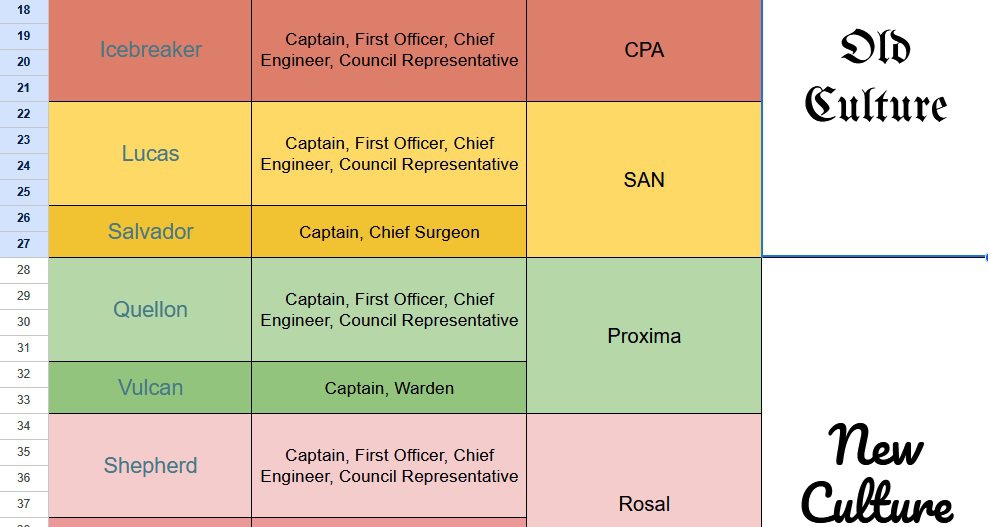
Here is a bit of the spreadsheet sent out, which listed people’s names and their roles on each ship. As you can already see, some ships were bigger and had more staff, while others were smaller. We were assigned the Salvador, playing as the medical crew.
I also appreciated the set up for Den of Wolves. They had a great wargaming board for ship attacks, a curtained off section for the council members, and a projector with siren sound system for letting us know when a turn was over, when the media team was sending out important headline stories, or when the Wolf fleet caught up to us, attacking and causing any first officers (aka - ships who had military capabilities) to run over to the wargaming table and roll some dice to see how bad things would be.
Turns were set for 30 minutes, with 18 minutes meant for free play and 12 minutes to be on your own ship as news media gave their reports, morale checks were rolled, and announcements made. The whole goal of the game was to just survive, and maybe attempt to find a solution as things unfolded. Wolf attacks could happen at any time during those 18 minute windows, but if we kept making sure we had enough warp fuel and doing coordinated jumps, we could stay ahead of them.
A huge difference from The World Turned Upside Down was how we could readily move between ships, the idea being we each had our own personnel shuttle. At any time, you could go to another table and talk with the crew situated there to make deals. However, supplies could NOT freely go between ships.. You had to wait for ‘shuttles’ (little plastic tacklebox things that were easily carried) to come by while ‘driven’ by a crew member, give them your stuff, and then tell them where it had to be delivered.
One turn into the game, and all players realized where one of the key factors of Den of Wolves was, and that was intense resource management and networking. We had a mining ship that could get resources, but needed food from another ship that was essentially a floating greenhouse. The next few turns turned into organized chaos as captains or first officers ran between ships negotiating an elaborate network of trade so every ship would have enough food, fuel, and manpower.
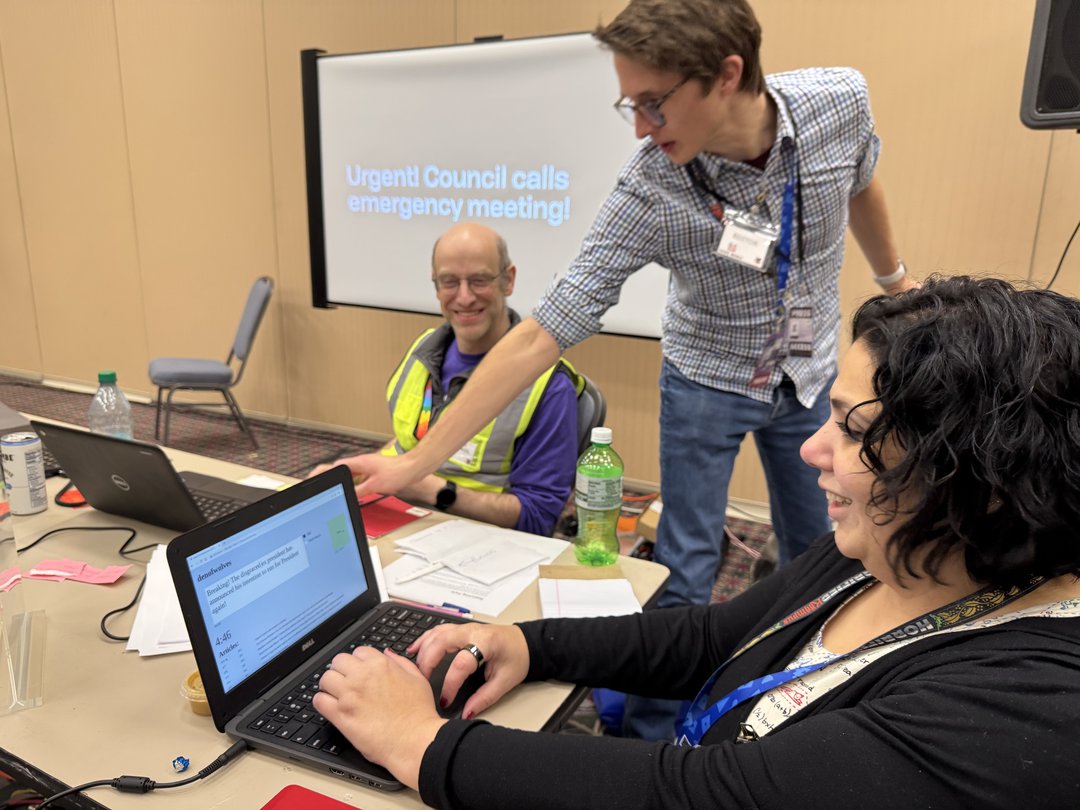
The media team and head organizer. Honestly, every mega game I've watched or played in that's had a media team seems to show them having so much fun. It's a lot trying to keep 40+ players informed every single turn... or in some cases misinformed. Some of their headlines would get huge laughs or groans of despair, everyone looking up from their projects to get updates.
At this point, I’m going to try and drop into the perspective that Nella and I had on the Salvador. We had one of the tiniest ships in the game, and couldn’t really create any resources on our own. Antonella was my chief surgeon, and I was the captain. We realized we were sitting ducks without any military capability or production besides the ability to heal crew members assigned on other ships… a small but vital need. Other players if ‘injured’ would also need our med bay. This gave us an idea and we went on a diplomatic offensive while also doing our best Bones impression from Star Trek.
I’ll try to quickly recount a few highlights from the first third of the game:
- After the first turn wrapped up and we saw our supplies gone, Nella and I realized we had enough for one more round before we’d be in danger of failing morale checks. Our first turn had been spent going around in character, so this next turn was spent now making our case as to why we deserved free supplies. Bigger passenger ships needed four or five times the amount of supplies than we did to function or fire their warp drives, and were starting to freak out.
- The first wolf attack happened in the second or third turn. I got stuck on the Quelleon, a massive ship that grew the food for the whole fleet, while Antonella ended up trapped on the mining vessel talking with their engineers. During a fleet attack, you couldn’t leave the ship you had been visiting, which was a great way to force conversations between crew and create interesting alliances and dynamics.
- At the start of the next turn, each ship punched in the warp coordinates we were given and told to keep on our tables, trying to get away before the wolves could catch up again. Success! …Except our sister ship from the same home planet, the Lucas, fails to reappear with us. They were gone.
- Utter panic. Many engineers and crew suddenly realized how backup fuel was vital at all times. Previous negotiations went out the window. Meanwhile, ship captains were called into a private meeting where it was explained that ship coordinates should be kept secret. The president of the interstellar council and the council passed down a rule we had to keep our codes covered at all times, and only the president could give the codes to captains, no one else.
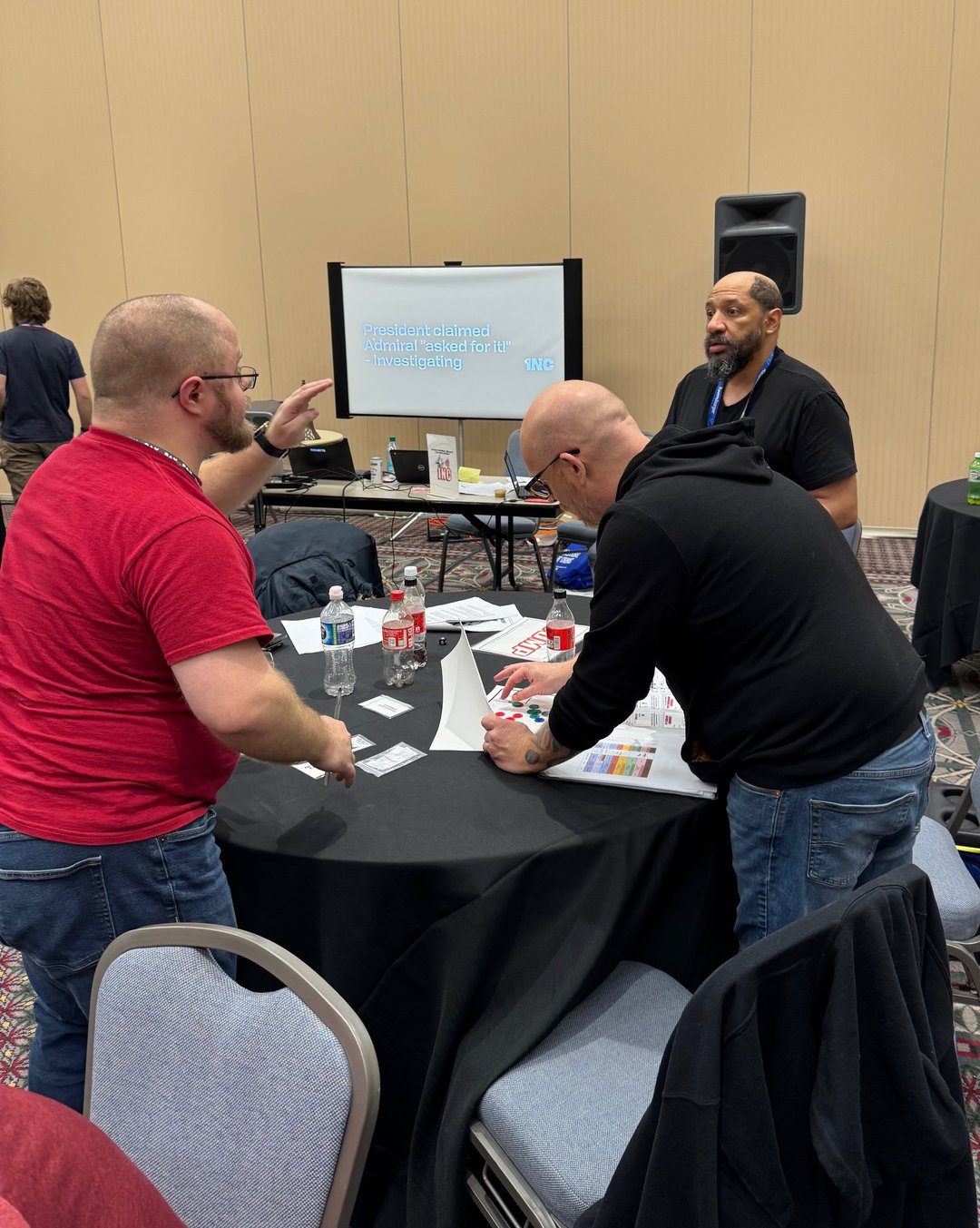
Tense negotiations between ships for supplies was the first half of this game. Everyone wanted to work together, but panic as events unfolded fast created chaos and confusion. When things started going wrong, some ships started distrusting others.
- The media team kicked into high gear. Headlines start playing in the middle of turns as captains are interviewed. Talk about hidden wolves is played up, suggesting it was sabotage. The inspector general came over and interviewed me to see if I ‘trusted’ the Lucas. Which I said I did, of course, because it was our sister ship.
- The Lucas reappeared a turn later, but depleted of all supplies. The inquisitor general interrogated them, and eventually the media ran the headline that it was all an error, with one number turned from a 1 into a 7, or vice versa. Another wolf attack happened.
- At this point, real damage starts happening to our fleet as combat ramps up. ‘Crew’ were being sent to be healed by our small ship, and sometimes actual players as well.
- Our status as invaluable is cemented as Nella and I realized if we had free medbays, we could help generate research points for the Vulcan, a specialist scientist ship that was creating upgrades for better fuel efficiency and more. The trade network of shuttles knows to always drop off supplies to us if there’s one or two extra food or fuel tokens.
- At this point, one of the limited shuttles has gone missing entirely, and sometimes, supplies or crew that we swore were supposed to be sent to help one ship ended up going to the wrong place. The media spun up more worries about the wolves among us, but no one can track them down. There are talks of wolf sympathizers, and also talks of how the council is being ineffective. They spent most of the game so far behind the curtain, and since we didn’t have a council seat, we had no idea what was happening besides when the media relayed information to everyone.
…Now, this game is going to be run again at this upcoming PAX Unplugged, so I don’t want to share too many details, even though every megagame can play out wildly differently. A few major moments I do want to share is how the missing shuttle was found tucked under a random chair in the convention room, dropped there by a wolf and revealed at the end of the game, entirely smug about it. A wolf nearly managed to become the president of the interstellar council by playing a long game of subtle manipulation, and every so often, a ship missed a warp jump, causing absolute panic and further lockdowns on who could see the codes.
We lived, but barely, with one ship blowing up in the finale due to sabotage and the wolves avoiding discovery the entire game. There were some notes of hope for the future, but no true resolution. You could call it perhaps a pyrrhic victory, but the wolves got a huge round of applause as they were revealed during the wrap up. The media team got a bunch of laughs for running more and more silly headlines as conspiracies and worries about the traitors grew throughout the course of the game.
Did I enjoy Den of Wolves? Yes, but not as much as my first megagame. There’s a few reasons why my own reactions were a bit more muted. The first of which was exhaustion: this game took place on Saturday night, and I had been working PAX Unplugged as press nonstop. I was also 7 years older, now a father, and very sleep deprived. To top it all off, I made some decisions to stay more neutral and hang back to take notes… which was a poor decision I didn’t realize until halfway through the game.
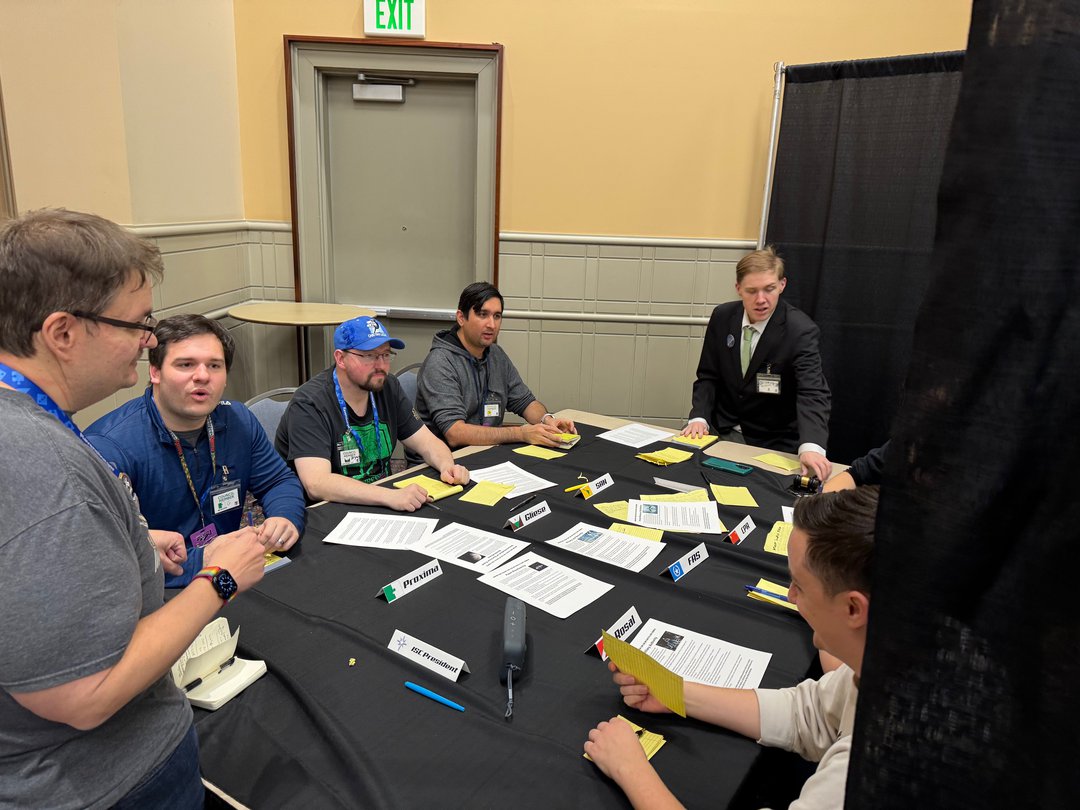
The Intergalactic Council. For the entire game, I had almost no idea what they were doing behind that curtain. Afterward, I heard about strong debates, revolts and protests, and a whole lot more happened... but that's part of the megagame structure. It's too big on purpose, to make the world feel alive and changing even without you directly involved in all events.
Exhaustion mixed with us being a small crew was a bad combination. Me and Antonella were fortunate enough to get out of personal danger quickly, and that was our mistake. We didn’t choose to interfere with the intergalactic council, we didn’t choose to use our downtime to say we could help the Inquisitor general track down the wolves… we didn’t take initiative. Would it have helped if we had a council member on our ship or had some stake in the military minigame? Sure, but at the end of the day, I have to fully admit that Den of Wolves being ‘a good time’ instead of ‘one of the best games ever’ came down to personal choices made. The last few rounds were still a blast as even we were sucked up into voting and accusations, but I definitely left that night feeling like I had twiddled my thumbs stupidly during the middle of the game.
I know I’ll sound like a broken record by the end of this article, but megagames love it when you take initiative, think outside the box, and get involved. Playing passively left me and Nella sitting for a turn or two, our issues already solved, waiting for other problems to come to us, like a good hospital ship! It gave us time to talk about what fun we had at the convention and catch up, but it didn’t have that spark like our first megagame together had years ago.
It was 11 pm as Den of Wolves wrapped up, and I had a great time talking to the other players. The science crew was an older bunch of gentlemen who used to play Dnd together years ago and wanted to try something new. I was left grinning as one of the wolves explained all the small things they did to throw off the fleet, leaving some of their fellow players shaking their fists in mock rage while laughing. It was a good time, and lessons were learned about what to do next time I had a chance to play in one of these.
A Quick List Of Downsides And Lessons Learned
Before I rave about how amazing megagames are, I want to quickly get the negatives out of the way… because there are negatives to Megagames. I genuinely feel they can be one of the best gaming moments of your life, but because of that, there are a lot of things that can go wrong as well. I’m hoping that by clearly listing these out, it could help newcomers to the genre.
- Megagames are a time and money investment. Megagames often run between 4-8 hours long, and from my own experiences, can cost somewhere between 30-50 dollars to play. While that isn’t an awful cost for a bespoke experience, it can feel like a lot if you are paying that cost on top of a convention ticket. It’s also a long time commitment away from other parts of a convention. Is it worth it? That’s going to have to be up to you.
- Bring Snacks! This one isn’t so much a negative as it is a helpful tip. You WILL be stuck in that room for hours. Having snacks and a water bottle can go a long way to helping you feel present in the moment.
- The results can be out of your control. The joy of a megagame is in how everyone can shape the narrative. The pain in a megagame is in how everyone can shape the narrative. This is a collaborative story in the end, and you should know it isn’t about winning or losing, but instead being part of a bigger narrative.
- It’s a game for extroverts. From my two experiments with Megagames, they are just better when you are willing to interact with strangers. My first game was an absolute success because the spymasters banded together into a cohesive team across colony lines. My second game suffered because in my hopes to remain neutral and not be seen as intrusive, I ended up feeling a little left out of some of the fun chaos going on in the council and wolf hunting.
- Not all Megagames are for everyone. I realized a subtle difference between The World Turned Upside Down and Den of Wolves was how opposing players faced off. In the historical game, there was a shared opponent who could cause other colonies to defect, but there was a clear goal. In Den of Wolves, you immediately knowing there were betrayers in your midst pretending to be allies really set a tonal difference, at least in my mind. In this upcoming year of PAX Unplugged, there’s going to be megagames set in ancient rome with gods (woo!) and one based around being a ‘romantasy’ with soap opera melodrama baked in. Both sound fun, but only one sounds right for me.
All of this is to say that if you choose to participate in a megagame, even during a convention, make sure you commit to the bit. Save up your energy, do any reading they send you ahead of time about the game rules, and jump in with both feet. I’ve loved both games I played in, but I sincerely enjoyed the first one more because I let myself be bold, try new things, and sometimes took leaps of faith.

A screenshot from this little video on Megagames that Penny Arcade put out in 2017! Hopefully this video will help showcase just how many people were stuffed into a room and having a good time: https://www.youtube.com/watch?v=OTEtQvGU1h0
There’s always a chance you might not ‘win’... but winning really isn’t the point. It’s about seeing a story come together as each player’s choices stack on top of each other, and knowing you had a role in that story. It’s about making fast friends and foes for just a few hours and savoring the rush of tension. If that sounds like fun, great! If it isn’t your cup of tea or something that might not be right for you to try while at a gaming convention, now you know.
A Good Megagame Feels Like You've Captured Lightning In A Bottle
On paper, megagames shouldn’t work. There are so many variables, so many players, so many ideas squeezed into one small space. Event organizers are in an arms race of keeping the story unfolding as players try to win, break the game, or spin off into their own strange sidequests. And yet, when it all comes together, you have the capacity for magic.
I’ve finished writing this article in the last week of October 2025. At noon on Halloween, the preregistration forms open for the megagames at PAX Unplugged 2025. There’s a wide variety this year, ranging from a refreshed and updated Den of Wolves to one set in an alternate 1920s with mechs, based on the board game Scythe. There’s even a cyberpunk themed megagame that’s being run by Mythworks, based off their wonderful ttrpg CBR+PNK.
If anything I’ve said about how megagames work has intrigued you and you are going to PAX Unplugged this year, I highly encourage you to think about signing up with some friends. If you are intrigued by the idea at all, just google if there are megagames in your area! If you are lucky, you’ll have a local group like Philadelphia Megagames.
If you’ve played in a megagame yourself and want to share your experiences here, please leave your thoughts so others can decide if they want to try one for themselves. And lastly, if you do decide to try one for the first time… I really hope you have a magical time like I have, and I’ve seen others have as well.